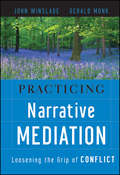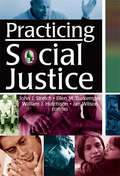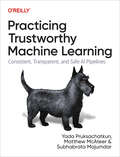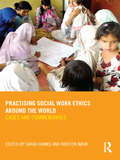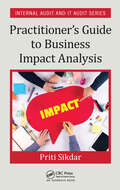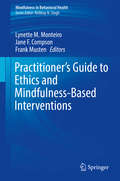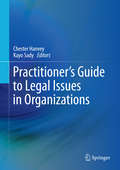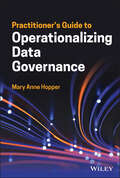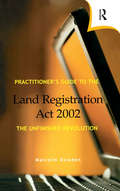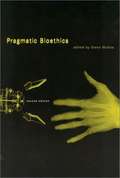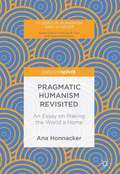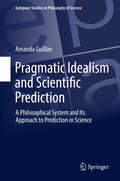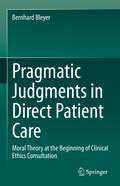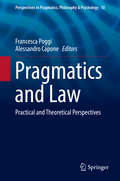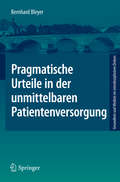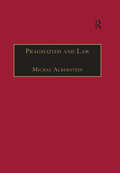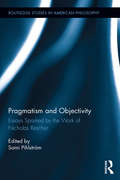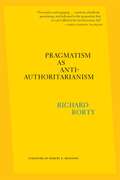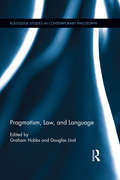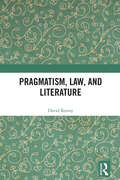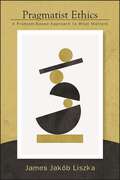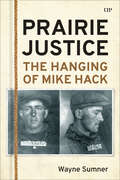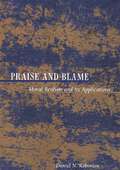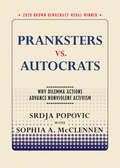- Table View
- List View
Practicing Medicine and Ethics
by Lauris Christopher KaldjianTo practice medicine and ethics, physicians need wisdom and integrity to integrate scientific knowledge, patient preferences, their own moral commitments, and society's expectations. This work of integration requires a physician to pursue certain goals of care, determine moral priorities, and understand that conscience or integrity require harmony among a person's beliefs, values, reasoning, actions, and identity. But the moral and religious pluralism of contemporary society makes this integration challenging and uncertain. How physicians treat patients will depend on the particular beliefs and values they and other health professionals bring to each instance of shared decision making. This book offers a framework for practical wisdom in medicine that addresses the need for integrity in the life of each health professional. In doing so, it acknowledges the challenge of moral pluralism and the need for moral dialogue and humility as professionals fulfill their obligations to patients, themselves, and society.
Practicing Narrative Mediation
by John Winslade Gerald D. MonkPracticing Narrative Mediation provides mediation practitioners with practical narrative approaches that can be applied to a wide variety?of conflict resolution?situations. Written by John Winslade and Gerald Monk--leaders in the narrative therapy movement--the book contains suggestions and illustrative examples for applying the proven narrative technique when working with restorative conferencing and mediation in organizations, schools, health care, divorce cases, employer and employee problems, and civil and international conflicts. Practicing Narrative Mediation also explores the most recent research available on discursive positioning and exposes the influence of the moment-to-moment factors that are playing out in conflict situations. The authors include new concepts derived from narrative family work such as "absent but implicit," "double listening," and "outsider-witness practices."
Practicing Social Justice
by Jan Wilson Ellen Burkemper William J Hutchison John J StretchExamine new research and innovative programs targeted to serve vulnerable populations! This collection highlights innovative programs and interventions targeted toward underserved, vulnerable, and marginalized populations, including the homeless, immigrants, refugees, female ex-offenders, people with developmental disabilities who are entering the criminal justice system, homicidal youth, and children whose parents are involved in high-conflict custody disputes. In addition, Practicing Social Justice raises critical questions on how society should justly provide for the economic well-being of our most valuable human asset-our children-with an incisive look at the Temporary Aid for Needy Families legislation and its long-term impact on disadvantaged children. This book also evaluates the Bridges Across Racial Polarization Programs® and explores a wide selection of important social justice issues that the social workers of today and tomorrow need to understand. Specifically, this well-referenced book: details the mission and guiding principles of the Emmet and Mary Doerr Center for Social Justice at the Saint Louis University School of Social Service, with a focus on the Center's innovative partnered approach examines nine models/theories of justice with varying philosophical, sectarian, and nonsectarian orientations illustrates innovative approaches to community economic development for previously neglected poor communities, including an inclusive community plan structured to bring about home ownership, macro-enterprises, and the accumulation of capital through savings documents the rise of homelessness in the state of Missouri-in spite of an unprecedented period of economic growth and general prosperity explores social justice concerns for immigrants and refugees entering the United States, with a focus on providing positive community commitment and response describes an empowering, strengths-based program that can help female ex-offenders to find and develop support from the community champions the social rights of people with developmental disabilities who are entering the criminal justice system proposes systemic reform for homicidal youth in terms of prevention, intervention, and remediation describes a program designed to provide a safe environment for the supervised visitation of children in high-conflict custody disputes, providing security for both parents and children advocates for innovative inpatient-staff participatory decision-making in mental health hospitals, offering an approach designed to increase patient control over decisions directly affecting their well-being and more!
Practicing Trustworthy Machine Learning: Consistent, Transparent, and Fair AI Pipelines
by Yada Pruksachatkun Matthew Mcateer Subho MajumdarWith the increasing use of AI in high-stakes domains such as medicine, law, and defense, organizations spend a lot of time and money to make ML models trustworthy. Many books on the subject offer deep dives into theories and concepts. This guide provides a practical starting point to help development teams produce models that are secure, more robust, less biased, and more explainable.Authors Yada Pruksachatkun, Matthew McAteer, and Subhabrata Majumdar translate best practices in the academic literature for curating datasets and building models into a blueprint for building industry-grade trusted ML systems. With this book, engineers and data scientists will gain a much-needed foundation for releasing trustworthy ML applications into a noisy, messy, and often hostile world.You'll learn:Methods to explain ML models and their outputs to stakeholdersHow to recognize and fix fairness concerns and privacy leaks in an ML pipelineHow to develop ML systems that are robust and secure against malicious attacksImportant systemic considerations, like how to manage trust debt and which ML obstacles require human intervention
Practising Social Work Ethics Around the World: Cases and Commentaries
by Sarah Banks and Kirsten NøhrEthics is an increasingly important theme in social work practice. Worldwide, social workers experience common ethical challenges (how to be fair, whether to break a rule, how to act in politically tense situations) in very different contexts – from disaster relief in China to child protection work in Palestine. This book takes as its starting point real life cases featuring ethical problems in the areas of: negotiating roles and boundaries, respecting rights, being fair, challenging and developing organisations and working with policy and politics. Each case opens with a brief introduction, is followed by two commentaries and ends with questions for reflection. The commentaries, written by authors from different countries, refer to relevant theories, concepts, practical matters, alternative courses of action and their implications. Features within the book include: An introductory chapter covering issues of global ethics Cases and commentaries drawn from across the world – from Peru to Finland Cases based on real life situations and chapter introductions from leading authorities in social work and ethical theory Questions and practical exercises to aid teaching and professional development This book is a unique and accessible resource for stimulating ethical reflection, expanding ethical horizons and developing ethical and intercultural sensitivity. It is designed for use by undergraduate and postgraduate students and professionals in the fields of social work, social education/pedagogy, social care work, international social work, community development, community organisation, youth work and related fields.
Practitioner's Guide to Business Impact Analysis (Security, Audit and Leadership Series)
by Priti SikdarThis book illustrates the importance of business impact analysis, which covers risk assessment, and moves towards better understanding of the business environment, industry specific compliance, legal and regulatory landscape and the need for business continuity. The book provides charts, checklists and flow diagrams that give the roadmap to collect, collate and analyze data, and give enterprise management the entire mapping for controls that comprehensively covers all compliance that the enterprise is subject to have. The book helps professionals build a control framework tailored for an enterprise that covers best practices and relevant standards applicable to the enterprise. Presents a practical approach to assessing security, performance and business continuity needs of the enterprise Helps readers understand common objectives for audit, compliance, internal/external audit and assurance. Demonstrates how to build a customized controls framework that fulfills common audit criteria, business resilience needs and internal monitoring for effectiveness of controls Presents an Integrated Audit approach to fulfill all compliance requirements
Practitioner's Guide to Ethics and Mindfulness-Based Interventions
by Lynette M. Monteiro Jane F. Compson Frank MustenThis book focuses on the role of ethics in the application of mindfulness-based interventions (MBIs) and mindfulness-based programs (MBPs) in clinical practice. The book offers an overview of the role of ethics in the cultivation of mindfulness and explores the way in which ethics have been embedded in the curriculum of MBIs and MBPs. Chapters review current training processes and examines the issues around incorporating ethics into MBIs and MBPs detailed for non-secular audiences, including training clinicians, developing program curriculum, and dealing with specific client populations. Chapters also examine new, second-generation MBIs and MBPs, the result of the call for more advanced mindfulness-based practices . The book addresses the increasing popularity of mindfulness in therapeutic interventions, but stresses that it remains a new treatment methodology and in order to achieve best practice status, mindfulness interventions must offer a clear understanding of their potential and limits. Topics featured in this book include: * Transparency in mindfulness programs. * Teaching ethics and mindfulness to physicians and healthcare professionals. * The Mindfulness-Based Symptom Management (MBSM) program and its use in treating mental health issues. * The efficacy and ethical considerations of teaching mindfulness in businesses. * The Mindful Self-Compassion (MSC) Program. * The application of mindfulness in the military context. Practitioner's Guide to Mindfulness and Ethics is a must-have resource for clinical psychologists and affiliated medical, and mental health professionals, including specialists in complementary and alternative medicine and psychiatry. Social workers considering or already using mindfulness in practice will also find it highly useful.
Practitioner's Guide to Legal Issues in Organizations
by Chester Hanvey Kayo SadyThis highly useful reference outlines best practices in key areas of human resources that are not only fair and equitable, but that can withstand legal scrutiny. Industrial/organizational experts apply their empirical knowledge and practical experience to aspects of HR that are commonly litigated, including broad and specific topics in testing of potential employees, disability issues, compensation and pay equity, and work hours. The book is written to be accessible to readers currently in HR-related graduate-level training as well as HR practitioners with or without background in industrial/organizational psychology. And to add to its utility, chapters feature practical strategies for addressing each of the legal issues presented. Among the topics covered: Measuring adverse impact in employee selection decisions. Using background checks in the employee selection process. Disabilities: best practices for vulnerabilities associated with the ADA. Physical abilities testing. Wage and hour litigation. Clinical psychological testing for employee selection. Conducting compensation equity analyses. Practitioner's Guide to Legal Issues in Organizations brings clear, up-to-date information to graduate students studying human resources, management, industrial/organizational psychology who are interested in legal issues, as well as applied HR practitioners such as industrial/organizational psychologists, human resources generalists, management and labor economists.
Practitioner's Guide to Operationalizing Data Governance (Wiley and SAS Business Series)
by Mary Anne HopperDiscover what does—and doesn’t—work when designing and building a data governance program In A Practitioner’s Guide to Operationalizing Data Governance, veteran SAS and data management expert Mary Anne Hopper walks readers through the planning, design, operationalization, and maintenance of an effective data governance program. She explores the most common challenges organizations face during and after program development and offers sound, hands-on advice to meet tackle those problems head-on. Ideal for companies trying to resolve a wide variety of issues around data governance, this book: Offers a straightforward starting point for companies just beginning to think about data governance Provides solutions when company employees and leaders don’t—for whatever reason—trust the data the company has Suggests proven strategies for getting a data governance program that’s gone off the rails back on trackComplete with visual examples based in real-world case studies, A Practitioner’s Guide to Operationalizing Data Governance will earn a place in the libraries of information technology executives and managers, data professionals, and project managers seeking a one-stop resource to help them deliver practical data governance solutions.
Practitioner's Guide to the Land Registration Act 2002
by Malcolm DowdenKey provisions of the Land Registration Act 2002 provide the legal framework for electronic conveyancing. This book will explain the legislative framework and the current proposals – including the key issues of security and authorisation – and will highlight the points that need to be addressed by practitioners in order to qualify for access to the new system.Electronic conveyancing will not be with us until 2006 and this book will take a thematic approach, highlighting the main practical issues arising from the new law and providing precedents and checklists to help busy conveyancers to manage the risks. This book will seek to highlight – and to give practical advice on – the day to day requirements of the new regime, and to promote sensible and cost-effective management of the risks.
Pragmatic Bioethics (Second Edition)
by Glenn McgeeModern scientific and medical advances bring new complexity and urgency to ethical issues in health care and biomedical research. This book applies the American philosophical theory of pragmatism to such bioethics. Critics of pragmatism argue that it lacks a universal moral foundation. Yet it is this very lack of a metaphysical dividing line between facts and values that makes pragmatism such a rigorous and appropriate method for solving problems in bioethics. For pragmatism, ethics is a way of satisfying the complex demands of multiple individuals and groups in a contingent and changing world. Pragmatism also demands careful attention to the ways in which scientific advances change our values and ethics. The essays in this book present different approaches to pragmatism and different ways of applying pragmatism to scientific and medical matters. They use pragmatism to guide thinking about such timely topics as stem cell research, human cloning, genetic testing, human enhancement, and care for the poor and aging. This new edition contains three new chapters, on difficulties with applying pragmatism to law and bioethics, on helping people to die, and on embryonic stem cell research.
Pragmatic Humanism Revisited: An Essay on Making the World a Home (Studies in Humanism and Atheism)
by Ana HonnackerHow can we feel at home in this world without clinging to false certainties? This book offers a humanist re-reading of philosophical pragmatism and explores its potentials for a worldview that relies only on human resources. Thinking along with authors like William James and F.C.S. Schiller, it highlights a fundamentally humanist strand of pragmatism aimed at fostering human creativity and transformative action. It is grounded in everyday experience and underlines our responsibility to strive for the better. Ana Honnacker traces perspectives on science, religion, and ethics in the light of a pragmatic understanding of humanism. Furthermore, she suggests how to address the existential challenges we face today. Thus, pragmatic humanism is explored not only as a philosophy for critical minds, but also as a way of life.
Pragmatic Idealism and Scientific Prediction
by Amanda GuillánThis monograph analyzes Nicholas Rescher’s system of pragmatic idealism. It also looks at his approach to prediction in science. Coverage highlights a prominent contribution to a central topic in the philosophy and methodology of science. The author offers a full characterization of Rescher’s system of philosophy. She presents readers with a comprehensive philosophico-methodological analysis of this important work. Her research takes into account different thematic realms: semantic, logical, epistemological, methodological, ontological, axiological, and ethical. The book features three, thematic-parts: I) General Coordinates, Semantic Features and Logical Components of Scientific Prediction; II) Predictive Knowledge and Predictive Processes in Rescher’s Methodological Pragmatism; and III) From Reality to Values: Ontological Features, Axiological Elements, and Ethical Aspects of Scientific Prediction. This insightful analysis offers a critical reconstruction of Rescher’s philosophy. The system he created is often characterized as pragmatic idealism that is open to some realist elements. He is a prominent representative of contemporary pragmatism who has made a great deal of contributions to the study of this topic. This area is crucial for science and it has been little considered in the philosophy of science.
Pragmatic Judgments in Direct Patient Care: Moral Theory at the Beginning of Clinical Ethics Consultation
by Bernhard BleyerWhy does a hospital need an ethics consultation? And what about this counselling is ethical? The book explains the background of the development of clinical ethics counselling. It provides new insights into serious decision-making conflicts in everyday clinical life and uncovers the disputes that followed in public. In the search for the ethical understanding of clinical ethics counselling, the book comes across previously unexplored evidence. Step by step, a system is reconstructed that reveals the shape of a significant philosophical school of thought.
Pragmatics and Law
by Alessandro Capone Francesca PoggiThis volume is the second part of a project which hosts an interdisciplinary discussion about the relationship among law and language, legal practice and ordinary conversation, legal philosophy and the linguistics sciences. An international group of authors, from cognitive science, philosophy of language and philosophy of law question about how legal theory and pragmatics can enrich each other. In particular, the first part is devoted to the analysis of how pragmatics can solve problems related to legal theory: What can pragmatics teach about the concept of law and its relationship with moral, and, in particular, about the eternal dispute between legal positivism and legal naturalism? What can pragmatics teach about the concept of law and/or legal disagreements? The second part is focused on legal adjudication: it aims to construct a pragmatic apparatus appropriate to legal trial and/or to test the tenure of the traditional pragmatics tools in the field. The authors face questions such as: Which interesting pragmatic features emerge from legal adjudication? What pragmatic theories are better suited to account for the practice of judgment or its particular aspects (such as the testimony or the binding force of legal precedents)? Which pragmatic and socio-linguistic problems are highlighted by this practice?
Pragmatische Urteile in der unmittelbaren Patientenversorgung: Moraltheorie an den Anfängen Klinischer Ethikberatung (Gesundheit und Medizin im interdisziplinären Diskurs)
by Bernhard BleyerWozu braucht ein Krankenhaus eine Ethikberatung? Und was an dieser Beratung ist ethisch? Das Buch erklärt die Hintergründe der Entstehungsprozesse Klinischer Ethikberatung. Es gewährt neue Einblicke in schwerwiegende Entscheidungskonflikte des klinischen Alltags und deckt die vehementen Auseinandersetzungen auf, die sich öffentlich daran anschlossen. Auf der Suche nach dem Ethikverständnis der Klinischen Ethikberatung trifft das Buch auf bisher nicht ausgewertete Hinweise. Schritt für Schritt wird eine Systematik rekonstruiert, die die Gestalt einer bedeutsamen philosophischen Denkrichtung erkennen lässt.
Pragmatism and Law: From Philosophy to Dispute Resolution (Law, Justice and Power)
by Michal AlbersteinPragmatism and Law provides a textual reading of the American legal discourse, as it unfolds through various genres of pragmatism, which evolve and transform during the twentieth century. The historical narrative, which the book weaves, traces the transformation of the pragmatic idea from the forefront of philosophical intellectual inquiries at the turn of the twentieth century to a common sense lawyers’ practical rule of action at the turn of the twenty-first century. During this sequence, a fresh look at American history and legal history in particular is offered through the emphasis on recurring discursive structures which assume incommensurable treatments of basic liberal notions like justice, politics, and truth. Underlying the writing is an interpretative mode of inquiry, based on European post-structural methodologies, while claiming to represent their next intellectual phase. This contemporary mode of inquiry is that of a reading which insists on healing through the paradoxes. It is the same mode that sets, in the author’s view, the updated interpretative model of dispute resolution studies.
Pragmatism and Objectivity: Essays Sparked by the Work of Nicholas Rescher (Routledge Studies in American Philosophy)
by Sami PihlströmPragmatism and Objectivity illuminates the nature of contemporary pragmatism against the background of Rescher’s work, resulting in a stronger grasp of the prospects and promises of this philosophical movement. The central insight of pragmatism is that we must start from where we find ourselves and deflate metaphysical theories of truth in favor of an account that reflects our actual practices of the concept. Pragmatism links truth and rationality to experience, success, and action. While crude versions of pragmatism state that truth is whatever works for a person or a community, Nicholas Rescher has been at the forefront of arguing for a more sophisticated pragmatist position. According to his position, we can illuminate a robust concept of truth by considering its links with inquiry, assertion, belief, and action. His brand of pragmatism is objective and organized around truth and inquiry, rather than other forms of pragmatism that are more subjective and lenient. The contingency and fallibility of knowledge and belief formation does not mean that our beliefs are simply what our community decides, or that truth and objectivity are spurious notions. Rescher offers the best chance of understanding how it is that beliefs can be the products of human inquiry yet aim at the truth nonetheless. The essays in this volume, written by established and up-and-coming scholars of pragmatism, touch on themes related to epistemology, philosophy of mind, philosophy of science, and ethics.
Pragmatism as Anti-Authoritarianism
by Richard RortyThe last book by the eminent American philosopher and public intellectual Richard Rorty, providing the definitive statement of his mature philosophical and political views. Richard Rorty’s Pragmatism as Anti-Authoritarianism is a last statement by one of America’s foremost philosophers. Here Rorty offers his culminating thoughts on the influential version of pragmatism he began to articulate decades ago in his groundbreaking Philosophy and the Mirror of Nature. Marking a new stage in the evolution of his thought, Rorty’s final masterwork identifies anti-authoritarianism as the principal impulse and virtue of pragmatism. Anti-authoritarianism, on this view, means acknowledging that our cultural inheritance is always open to revision because no authority exists to ascertain the truth, once and for all. If we cannot rely on the unshakable certainties of God or nature, then all we have left to go on—and argue with—are the opinions and ideas of our fellow humans. The test of these ideas, Rorty suggests, is relatively simple: Do they work? Do they produce the peace, freedom, and happiness we desire? To achieve this enlightened pragmatism is not easy, though. Pragmatism demands trust. Pragmatism demands that we think and care about what others think and care about, which further requires that we account for others’ doubts of and objections to our own beliefs. After all, our own beliefs are as contestable as anyone else’s. A supple mind who draws on theorists from John Stuart Mill to Annette Baier, Rorty nonetheless is always an apostle of the concrete. No book offers a more accessible account of Rorty’s utopia of pragmatism, just as no philosopher has more eloquently challenged the hidebound traditions arrayed against the goals of social justice.
Pragmatism, Law, and Language (Routledge Studies in Contemporary Philosophy)
by Graham Hubbs Douglas LindThis volume puts leading pragmatists in the philosophy of language, including Robert Brandom, in contact with scholars concerned with what pragmatism has come to mean for the law. Each contribution uses the resources of pragmatism to tackle fundamental problems in the philosophy of language, the philosophy of law, and social and political philosophy. In many chapters, the version of pragmatism deployed proves a fruitful approach to its subject matter; in others, shortcomings of the specific brand of pragmatism are revealed. The result is a clearer understanding of what pragmatism has meant and can mean across these tightly related philosophical areas. The book, then, is itself pragmatism in action: it seeks to clarify its unifying concept by examining the practices that centrally involve it.
Pragmatism, Law, and Literature
by David KennyThis book uses literary examples to make the case for understanding law and the legal system through the lens of philosophical pragmatism.For pragmatists, experience is everything; they argue against understanding the world through any abstraction, maintaining that it is simply too complicated to fit into categories or theories. Legal pragmatism is the application of this philosophy to the making of law, the practice of law, and the practice of judging. This book maintains that the best way to understand legal pragmatism is not through bare theoretical exegesis but through literature: that is, through stories that cast light on various pragmatic aspects of law. Engaging a range of literary sources, including works by Seamus Heaney, Hilary Mantel, Harper Lee, and Ian McEwan, the book makes a compelling case for the contemporary relevance of pragmatism.This book will appeal to legal theorists, law and literature/humanities scholars, readers of literary criticism, and those with interests in pragmatist philosophy.
Pragmatist Ethics: A Problem-Based Approach to What Matters (SUNY series in American Philosophy and Cultural Thought)
by James Jakób LiszkaGrounded in American pragmatism, Pragmatist Ethics proposes a rethinking of ethics. Rather than looking to the good—a concept for which consensus is difficult to achieve—pragmatists instead advocate for tending to the problems of the day. James Jakób Liszka examines how daily practices and institutions are originally conceived and then evolve to solve certain problems, and that their failure to do so is the source of most problems. Liszka argues that the ethical goal, therefore, is to improve upon these practices and that the sort of practical reasoning that characterizes practices can be enhanced by a more scientific, empirical approach. But how do we know when changes to practices and institutions are progressive? Problems will plague the best of communities; the better community is the one that succeeds best at solving its problems. Pragmatist Ethics examines various accounts of improvement and progress, concluding that the problem-solving effectiveness of communities is the key to progressive changes.
Prairie Justice: The Hanging of Mike Hack (Osgoode Society for Canadian Legal History)
by Wayne SumnerIn May 1928, the body of George Edey was discovered on his Saskatchewan farm, leading to the swift arrest of a deaf and mentally disabled farmhand named Mike Hack. Following a three-day murder trial, Hack was quickly convicted and sentenced to death. Denied clemency, in January 1929 he was hanged in the courtyard of the Regina Jail at twenty-seven years of age and buried in an unmarked grave. Prairie Justice dissects this case, revealing its implications for important themes in the history of the Canadian criminal justice system. Wayne Sumner meticulously traces the narrative of the case, analysing each step from the initial murder investigation to the subsequent arrest, trial, conviction, denial of clemency, and execution of the man accused. Drawing on a personal connection to the case rooted in his family history – his father’s hometown was the village where the crime occurred, and both his grandfather and great-grandfather were involved in the investigation – Sumner uncovers deeper and more universal reasons to share the story. The book punctuates the narrative with insightful analysis on key criminal justice themes illustrated by the case: unfitness to stand trial, the defence of insanity, ineffective assistance of counsel, wrongful conviction, and miscarriage of justice. Ultimately, Prairie Justice exposes how access to justice can be merely illusory for the poor and marginalized.
Praise and Blame: Moral Realism and Its Applications (New Forum Books #27)
by Daniel N. RobinsonHow should a prize be awarded after a horse race? Should it go to the best rider, the best person, or the one who finishes first? To what extent are bystanders blameworthy when they do nothing to prevent harm? Are there any objective standards of moral responsibility with which to address such perennial questions? In this fluidly written and lively book, Daniel Robinson takes on the prodigious task of setting forth the contours of praise and blame. He does so by mounting an important and provocative new defense of a radical theory of moral realism and offering a critical appraisal of prevailing alternatives such as determinism and behaviorism and of their conceptual shortcomings. The version of moral realism that arises from Robinson's penetrating inquiry--an inquiry steeped in Aristotelian ethics but deeply informed by modern scientific knowledge of human cognition--is independent of cognition and emotion. At the same time, Robinson carefully explores how such human attributes succeed or fail in comprehending real moral properties. Through brilliant analyses of constitutional and moral luck, of biosocial and genetic versions of psychological determinism, and of relativistic-anthropological accounts of variations in moral precepts, he concludes that none of these conceptions accounts either for the nature of moral properties or the basis upon which they could be known. Ultimately, the theory that Robinson develops preserves moral properties even while acknowledging the conditions that undermine the powers of human will.
Pranksters vs. Autocrats: Why Dilemma Actions Advance Nonviolent Activism (Brown Democracy Medal)
by Srdja Popovic Sophia A. McClennenThe Lawrence and Lynne Brown Democracy Medal, presented by the McCourtney Institute for Democracy at Penn State, recognizes outstanding individuals, groups, and organizations that produce innovations to further democracy in the United States or around the world. The 2020 Brown Democracy Medal winner, Srdja Popovic, was a leader in the revolution that brought down the Milošević regime in Serbia and he contin-ues to help protestors around the world learn effective, sometimes humorous, nonviolent tactics. In 2020, he teamed up with Sophia A. McClennen to study the concept of "dilemma actions," which offers a structured, strategic approach to fighting back against authoritarianism, as well as for defending democracy.

